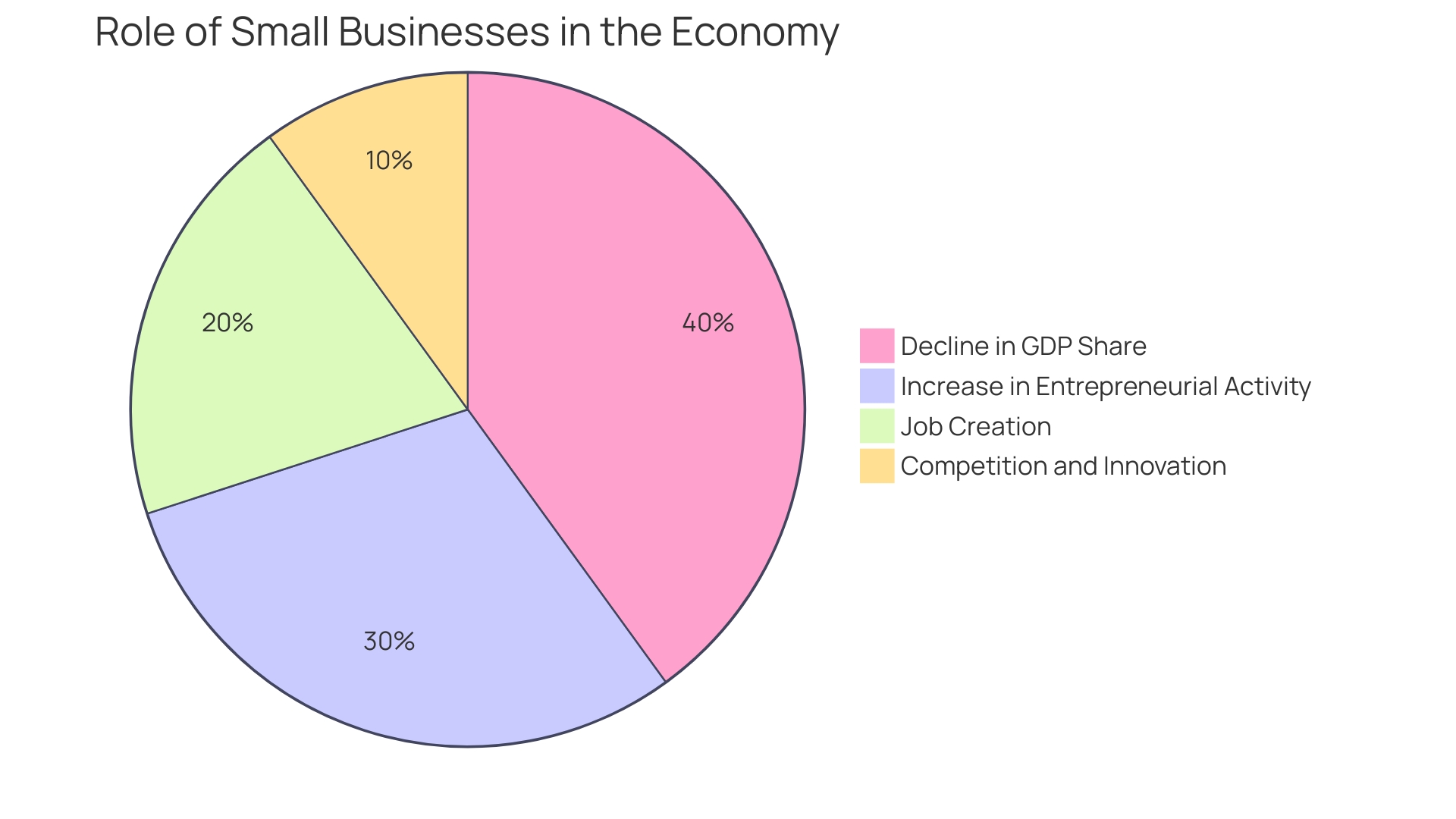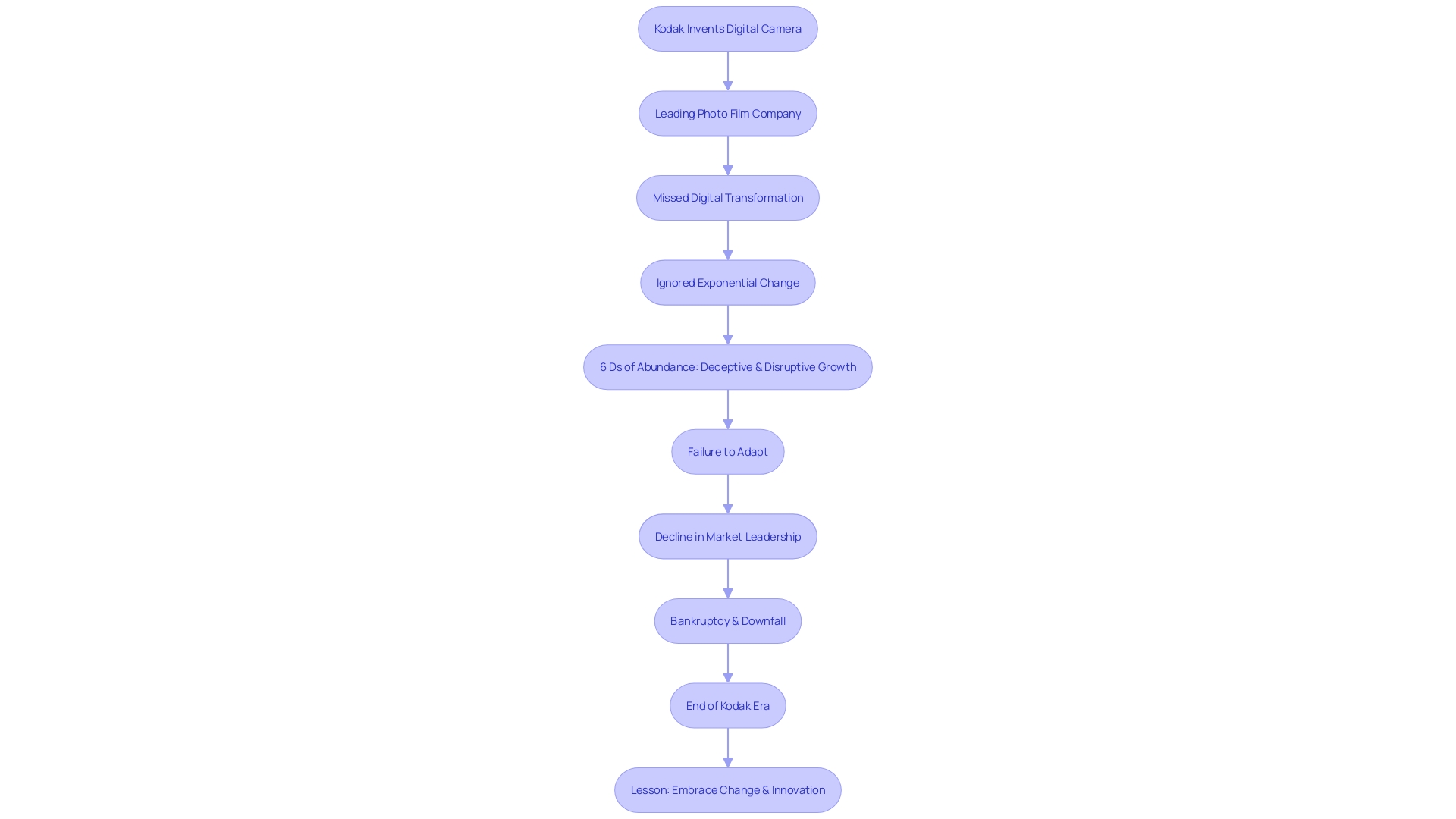Introduction
Understanding the common pitfalls that can lead to small business failure is crucial for entrepreneurs looking to build successful ventures. In this article, we explore the key factors that contribute to business failure and provide practical insights on how to avoid them. From financial mismanagement and lack of expertise to inadequate market demand and targeting, poor strategic planning and execution, ineffective marketing strategies, staff management issues, external factors, underestimating competition and failing to innovate, to poor record keeping and cash flow management, we delve into each area and offer actionable advice to help small business owners navigate these challenges.
By gaining a comprehensive understanding of these pitfalls and implementing the right strategies, entrepreneurs can position their businesses for sustainable growth and long-term success.
Financial Mismanagement
Comprehending the economic landscape is crucial for small businesses, as mistakes in this area are a common precursor to failure. Managing funds goes beyond basic record-keeping; it includes strategic planning and a profound comprehension of monetary well-being. Businesses that neglect to maintain a comprehensive view of their financial status may find themselves grappling with cash flow constraints and unsustainable operations. Even more concerning is the reality that in the past five years, one-third of enterprises have encountered existential risks. Yet, less than half sought professional advice to navigate these challenges, according to recent reports.
Amidst a period characterized by swift progress in technology, ecological issues, and changes in society influenced by occurrences like Brexit and the Covid-19 pandemic, enterprises of lesser scale face considerable strain. The pandemic alone has led to a downturn for nearly half of medium-sized enterprises (SMEs), with a consequential blow to employment and an uptick in company dissolutions. This has prompted a shift to new models for one in five small firms.
Given these complexities, the ability to secure financing emerges as a crucial skill. From a statistical standpoint, organizations that have the ability to access external resources are in a stronger position to withstand economic turbulence. The 2022 Small Business Credit Survey stated that 42% of employee-based enterprises acquired loans to handle economic difficulties. Yet, caution is advised to avoid a debilitating debt cycle without sufficient revenue to offset new loans.
Moreover, understanding when to seek external intervention, such as exploring bankruptcy options, is essential. As James Mohs, an expert in the accounting and law department at Pompea College of Business, asserts, the decision to declare bankruptcy should come after all other avenues have been exhausted, which may include refinancing, stock issuance, or seeking help from personal networks.
To prosper, enterprises must adopt uniqueness and worth in their monetary approaches, recognizing alterations influenced by economic downturns and regulatory changes. This comprehension can guide improved fiscal practices and regulations, advancing beyond dependence on personal assets or informal networks for capital. As the economic environment changes, companies must adjust with well-informed plans for sustainable expansion.

Lack of Expertise and Experience
A crucial downfall for small enterprises is the lack of adequate expertise and hands-on experience. Beyond the initial spark of a groundbreaking idea, a successful enterprise endeavor demands proficiency in a multitude of domains such as daily operations, strategic marketing, financial acumen, and leadership. A glaring example is witnessed in the unfortunate narrative of BetterBlends, a San Francisco-based establishment whose fluctuating operating hours and inconsistent management reflected a stark lack of understanding in running a restaurant. Similarly, the story of Smashmallow, an enterprise that thrived under the ambition to revolutionize snacking but perhaps scaled too quickly, echoes the repercussions of not matching growth with operational competence.
Sales expertise, in particular, stands out as a non-negotiable skill, as emphasized by business magnate Mark Cuban, who highlights the significance of conducting thorough research on the market, competition, and demographics before entering the entrepreneurial realm. This sentiment is reinforced by the insight that developing sales skills is tantamount to mastering communication—a crucial asset for any owner in attracting customers, securing financing, and negotiating partnerships. With over 600,000 startups globally, enterprises in technology, healthcare, and finance are flourishing, yet they are not immune to failure if foundational skills and preparation are lacking. According to the 2022 Small Business Credit Survey, 42% of enterprises with staff members sought loans to navigate obstacles in their finances, highlighting the importance of a comprehensive comprehension of monetary management to prevent a cycle of indebtedness. The collective wisdom from seasoned entrepreneurs and financial pundits alike serves as a clarion call for aspiring entrepreneurs to cultivate a well-rounded skill set and a strategic approach to their ventures.

Inadequate Market Demand and Targeting
Comprehending the industry and guaranteeing product-market compatibility are not just crucial for small enterprises but can determine the distinction between prospering and floundering. As evidenced by the struggles of the British womenswear brand Dai and the technical marvel yet misfit of Apple Vision Pro in the marketplace, aligning products and services with the needs and preferences of consumers is critical. Even prominent companies are not resistant to the dangers of insufficient market research and targeting, which can result in a disconnect with potential customers, leading to low sales and potentially the downfall of the organization.
Recent discoveries emphasize the fragile condition of enterprises, with a third facing significant challenges to their existence over a five-year span. These challenges are exacerbated by external factors such as technological advances, economic pressures, and global crises. Small enterprises, which make up an astonishing 99 percent of the commercial community and account for 50 percent of the workforce, are especially vulnerable to these dangers. By 2024, more than 33.2 million enterprises are operating in the United States alone, emphasizing the increased significance of perceptive market comprehension.
To navigate these turbulent waters, small enterprises must engage in continuous market research, probing questions about consumer demand, and adjusting their strategies to stay competitive. This includes understanding the logic and benefits behind their offerings, as sales skills are not simply about transactions but about effectively communicating the value proposition to the customer base. Utilizing these skills can secure financing, attract investors, and forge important distribution deals, all of which are crucial in the initial stages of company expansion.
With the sheer number of startups globally surpassing 600,000, the importance of preparation and understanding one's industry, competition, and customer demographics cannot be overstated. Small enterprises must be nimble and ready to pivot, as one in five did to a new model during the pandemic. Although there are numerous challenges, the significance of a well-researched and targeted approach to the industry is a fundamental key to the success of enterprises.
Poor Strategic Planning and Execution
A strategic foundation is crucial for any enterprise to flourish. When small enterprises struggle to create a distinct vision and clearly defined objectives, they frequently face challenges in making decisions, allocating resources, and adapting to shifts in the marketplace. For example, the ambitious Woven Planet project by Toyota intended to set a new standard in the automotive industry through innovative software. Despite the project's visionary roots, which anticipated a future of electric and software-dependent vehicles, its downfall was attributed to flawed execution, as highlighted in The Wall Street Journal's case study. The project's challenges serve as a cautionary tale of the dire consequences when strategic planning and execution fall short.
The significance of strategic planning is further underscored by the four key components identified by experts: objectives, strategy, development, and planning. Objectives provide measurable targets to strive for, while the strategy outlines the visionary steps necessary to achieve them. Development allows for ongoing improvement, and planning ensures timely actions support the strategy. This framework is not just theoretical; it's a practical approach that has been shown to foster resilience against unpredictable economic conditions, echoing Murphy’s Law of Combat that no battle plan survives contact with the enemy – a concept that translates well into the corporate arena.
Apart from strategic planning, the capability to market and elucidate the reasoning and advantages of decisions is an invaluable skill for any entrepreneur. As Cuban proposes, comprehensive preparation, which involves understanding your industry, competition, and market, is vital to a company's success. The 2022 Small Enterprise Credit Survey highlights that 42 percent of establishments with employees acquired loans to navigate financial challenges, underscoring the necessity for a strong plan to handle and repay debt.
While strategic planning and sales skills are crucial, they must be complemented by a keen awareness of the corporate environment. Startup Genome's report disclosing the abundance of over 600,000 startups globally, with technology, healthcare, and finance emerging as the most sought-after sectors, demonstrates the competitive landscape in which enterprises operate. A united plan, combined with the capability to market and adjust, is what ultimately empowers enterprises to navigate this landscape and evade the traps that result in lack of success.
Ineffective Marketing Strategies
Developing an effective marketing plan is crucial for enterprises aiming to establish their presence in a thriving industry. An incisive, well-executed plan can be the linchpin for reaching the intended audience, generating leads, and nurturing them into loyal customers. A lackluster approach to branding, a subpar online presence, or ineffective advertising can all severely dampen customer awareness and cripple potential revenue streams. The success stories of brands that have excelled in the art of strategic location leveraging, such as a specific hotel restaurant that witnessed a surge in food and beverage sales, highlight the significance of a nuanced marketing approach that comprehensively comprehends and caters to the intended target audience.
To replicate such achievement, small enterprises must undertake a comprehensive evaluation of their position in the industry, to identify their distinctive selling points and to delineate objectives that are particular, quantifiable, attainable, relevant, and time-limited. Businesses need to start by gauging their current standing in the market, identifying their distinct strengths and weaknesses, and scrutinizing the competitive landscape. The subsequent step is to set clear objectives, whether that's to broaden the customer base, launch new offerings, or heighten customer satisfaction.
The Milton Scene Business Membership exemplifies how a well-crafted marketing plan need not break the bank; it's a testament to how creativity and strategic use of tools can yield a high-impact marketing plan on a shoestring budget. This marketing solution provides local enterprises with a host of benefits, demonstrating that resource limitations can be overcome with astute planning.
Furthermore, content marketing arises as a crucial tactic, particularly for small enterprises. It's a technique that not only attracts a specific audience through consistent, quality content but also enhances brand presence and bridges the sales-marketing gap for B2B lead generation. The benefits are manifold: from driving website traffic to boosting SEO rankings, generating leads, and expanding brand recognition.
As Mark Cuban astutely highlights, the art of selling—or rather, the ability to express the logic and benefits of a decision—is an essential skill for anyone in the corporate domain. Whether persuading stakeholders, obtaining financing, or navigating distribution deals, sales expertise is crucial, particularly in the early stages of a venture.
Finally, with over 400 million enterprises making a contribution to the global economy and a noteworthy 33.2 million in the United States alone as we step into 2024, the necessity for strong marketing strategies becomes even more pronounced. Small enterprises not only act as the economy's backbone but also as a reflection of entrepreneurial spirit and innovation, making their growth and sustainability a matter of both economic and cultural significance.
Staff Management Issues
Managing staff challenges is vital for enterprises, as it can significantly impact their achievement or downfall. Issues such as recruiting unsuitable employees, providing insufficient training, managing poor communication, and failing to engage staff can erode the workplace atmosphere and impede productivity. It is crucial for small enterprises to advocate for effective personnel management strategies. This includes hiring adept individuals, delivering continuous training and support, cultivating a positive organizational culture, and encouraging transparent communication. Investment in workforce development is a powerful lever for fostering a driven and efficient team, propelling the organization forward. For example, IBL, a company operating in various sectors, emphasizes the significance of innovation and a well-rounded range of ideas to sustain a dynamic environment. Similarly, Chris Macksey's accounting firm exemplifies how industry-specific expertise can be leveraged to enhance operational efficiency, saving significant hours during critical periods like end-of-year audits. In the midst of the context of swift technological progress, economic pressures caused by events such as Brexit and the COVID-19 pandemic, and the drive towards achieving net-zero emissions, businesses of a modest scale are struggling with significant transformations. Recent research suggests that a significant portion of enterprises have encountered serious challenges in the last five years, and a minority have sought outside guidance for emergency preparation. Since small enterprises make up more than 99% of the population of companies, offering employment for approximately half of the workforce, their stability is crucial. Effective staff management is not just about internal processes, but also about adapting to external changes and preparing for future challenges.
External Factors: Economic Downturns and Uncontrollable Conditions
Small enterprises are frequently vulnerable to a multitude of external factors that can lead to their decline. Consider, for example, the tale of David Schein's consulting enterprise, which was located in a historic property that experienced a devastating fire in 2016. Although the main office survived, the fire disrupted essential services, demonstrating how sudden events can jeopardize operations. Similarly, Huldit's success in the outdoor gear industry showcases the importance of innovation and diversification. In the face of challenging circumstances such as economic recessions, market shifts, or regulatory changes, enterprises that offer distinctive products or services—like Huldit's versatile gear—can maintain resilience.
The food and beverage sector exemplifies an industry that endures even during economic downturns. Its inherent need-based nature ensures continued demand, as evidenced by the impressive $6.22 trillion in sales from food retail services between 1992 and 2019 in the U.S. alone. However, despite the federal government reporting economic growth, a survey involving over 6,000 owners of enterprises of limited size reveals a starkly different reality, with a mere 12% observing a surge in their growth.
Moreover, grants can have a substantial impact in strengthening enterprises. For instance, vehicle grants can enhance operational efficiency and extend, as emphasized in Small Business News, where such financial aid has proven crucial for mobile-based enterprises. With 33.2 million small enterprises in the U.S. as of early 2024, it's evident that small companies are pivotal to the economy. However, only 25% of these enterprises manage to endure beyond 15 years, indicating the necessity for strong tactics to navigate the external forces that can result in company collapse.
Small enterprises, although they cannot manage unforeseeable external factors, can implement strategies such as broadening their customer base and establishing backup plans to reduce the effects of these challenges. Through maintaining a robust financial position and proactively adapting to changes, enterprises of limited scale can strive to ensure their longevity and success.

Underestimating Competition and Failing to Innovate
The story of Kodak is a powerful illustration of how underestimating competition and a lack of innovation can result in the downfall of a once-thriving enterprise. In the 21st century's rapidly evolving commercial environment, enterprises must remain watchful and flexible, consistently striving to comprehend their consumer base and industry dynamics. The story of Kodak, a company that developed the first digital camera yet failed to capitalize on this groundbreaking technology, underscores the importance of embracing change and innovation. In a time when rapid expansion can swiftly make established enterprise models outdated, companies need to take the initiative to incorporate customer feedback, track industry trends, and improve their offerings to stay ahead and encourage growth. By acknowledging the risk of complacency in the industry and striving for continual improvement, small enterprises can avoid the pitfalls that befell Kodak and others in the face of disruptive technological advancements. Furthermore, market research is indispensable in identifying demand, understanding customer demographics, and gauging market size, which are essential factors in crafting strategies that ensure organization resilience and prosperity.

Poor Record Keeping and Cash Flow Management
Small enterprises are the foundation of the economy, but their prosperity depends on solid fiscal management. One of the core pillars of a flourishing enterprise is the careful maintenance of financial records and the skillful management of cash flow. These records are not merely about compliance; they're the guiding compass for strategic decision-making and resource allocation. However, the actuality is severe: a third of small enterprises have encountered existential threats in the past five years, and the recent pandemic has seen nearly half of SMEs experiencing a significant decrease in turnover.
The significance of a dedicated bank account for a company cannot be overstated—it establishes a clear boundary between personal and company finances, simplifying both daily accounting and tax filing. The selection of cash or accrual accounting methods, in conjunction with a well-structured chart of accounts, establishes a strong basis for tracking and analysis. A fiscal year tailored to the economic cycle can further streamline planning.
In a world where almost 50% of small enterprises do not seek external guidance, the importance of a skilled accountant is immeasurable. They are the protectors of financial accuracy, ensuring that every financial snapshot is a true reflection of the company's health. This accuracy allows owners to guide their ventures with confidence, even in the face of challenges such as evolving technology and pressing societal issues like net zero targets.
As we gaze into the future, it's clear that small businesses must be equipped to adapt. With the Canadian government recognizing this through measures like the Canada Carbon Rebate for Small Businesses, there's an acknowledgment of the need for support. Accurate bookkeeping and cash flow management are not optional—they're essential for survival and prosperity in a constantly changing economic landscape.
Conclusion
In conclusion, small business owners must avoid common pitfalls to ensure success. These include financial mismanagement, lack of expertise, inadequate market targeting, poor strategic planning, ineffective marketing, staff management issues, external factors, underestimating competition, and poor record keeping.
To overcome financial mismanagement, seek professional advice, secure external funds wisely, and explore bankruptcy as a last resort. Cultivate a well-rounded skill set and continuously learn to address lack of expertise.
Avoid inadequate market targeting through continuous research and adapting strategies. Establish a clear vision and strategic approach to overcome poor planning. Craft potent marketing strategies, prioritize effective staff management, and navigate external challenges.
Stay vigilant, embrace innovation, and conduct market research to avoid underestimating competition. Maintain accurate records and manage cash flow effectively. By implementing these strategies, entrepreneurs can position their businesses for sustainable growth and long-term success.
Position your business for sustainable growth and long-term success. Contact us today!




